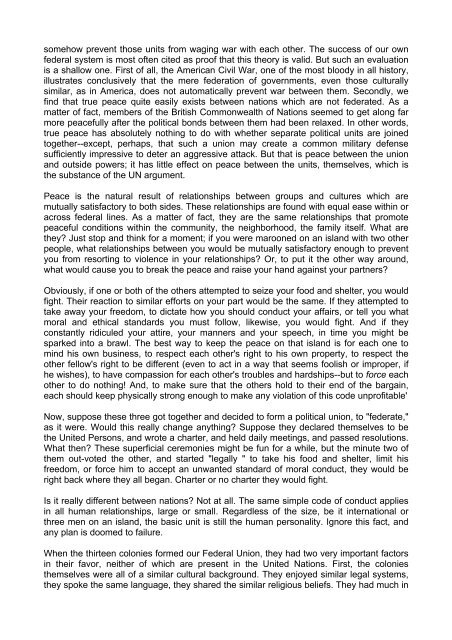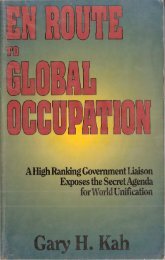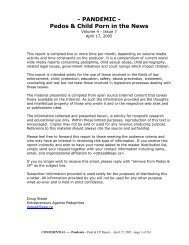G. Edward Griffin - The Fearful Master - PDF Archive
G. Edward Griffin - The Fearful Master - PDF Archive
G. Edward Griffin - The Fearful Master - PDF Archive
You also want an ePaper? Increase the reach of your titles
YUMPU automatically turns print PDFs into web optimized ePapers that Google loves.
somehow prevent those units from waging war with each other. <strong>The</strong> success of our own<br />
federal system is most often cited as proof that this theory is valid. But such an evaluation<br />
is a shallow one. First of all, the American Civil War, one of the most bloody in all history,<br />
illustrates conclusively that the mere federation of governments, even those culturally<br />
similar, as in America, does not automatically prevent war between them. Secondly, we<br />
find that true peace quite easily exists between nations which are not federated. As a<br />
matter of fact, members of the British Commonwealth of Nations seemed to get along far<br />
more peacefully after the political bonds between them had been relaxed. In other words,<br />
true peace has absolutely nothing to do with whether separate political units are joined<br />
together--except, perhaps, that such a union may create a common military defense<br />
sufficiently impressive to deter an aggressive attack. But that is peace between the union<br />
and outside powers; it has little effect on peace between the units, themselves, which is<br />
the substance of the UN argument.<br />
Peace is the natural result of relationships between groups and cultures which are<br />
mutually satisfactory to both sides. <strong>The</strong>se relationships are found with equal ease within or<br />
across federal lines. As a matter of fact, they are the same relationships that promote<br />
peaceful conditions within the community, the neighborhood, the family itself. What are<br />
they? Just stop and think for a moment; if you were marooned on an island with two other<br />
people, what relationships between you would be mutually satisfactory enough to prevent<br />
you from resorting to violence in your relationships? Or, to put it the other way around,<br />
what would cause you to break the peace and raise your hand against your partners?<br />
Obviously, if one or both of the others attempted to seize your food and shelter, you would<br />
fight. <strong>The</strong>ir reaction to similar efforts on your part would be the same. If they attempted to<br />
take away your freedom, to dictate how you should conduct your affairs, or tell you what<br />
moral and ethical standards you must follow, likewise, you would fight. And if they<br />
constantly ridiculed your attire, your manners and your speech, in time you might be<br />
sparked into a brawl. <strong>The</strong> best way to keep the peace on that island is for each one to<br />
mind his own business, to respect each other's right to his own property, to respect the<br />
other fellow's right to be different (even to act in a way that seems foolish or improper, if<br />
he wishes), to have compassion for each other's troubles and hardships--but to force each<br />
other to do nothing! And, to make sure that the others hold to their end of the bargain,<br />
each should keep physically strong enough to make any violation of this code unprofitable'<br />
Now, suppose these three got together and decided to form a political union, to "federate,"<br />
as it were. Would this really change anything? Suppose they declared themselves to be<br />
the United Persons, and wrote a charter, and held daily meetings, and passed resolutions.<br />
What then? <strong>The</strong>se superficial ceremonies might be fun for a while, but the minute two of<br />
them out-voted the other, and started "legally " to take his food and shelter, limit his<br />
freedom, or force him to accept an unwanted standard of moral conduct, they would be<br />
right back where they all began. Charter or no charter they would fight.<br />
Is it really different between nations? Not at all. <strong>The</strong> same simple code of conduct applies<br />
in all human relationships, large or small. Regardless of the size, be it international or<br />
three men on an island, the basic unit is still the human personality. Ignore this fact, and<br />
any plan is doomed to failure.<br />
When the thirteen colonies formed our Federal Union, they had two very important factors<br />
in their favor, neither of which are present in the United Nations. First, the colonies<br />
themselves were all of a similar cultural background. <strong>The</strong>y enjoyed similar legal systems,<br />
they spoke the same language, they shared the similar religious beliefs. <strong>The</strong>y had much in



![Robert T McQuaid [rtmq@stn.net] Sent: Friday, October 29, 2004 12 ...](https://img.yumpu.com/51070071/1/190x245/robert-t-mcquaid-rtmqstnnet-sent-friday-october-29-2004-12-.jpg?quality=85)







